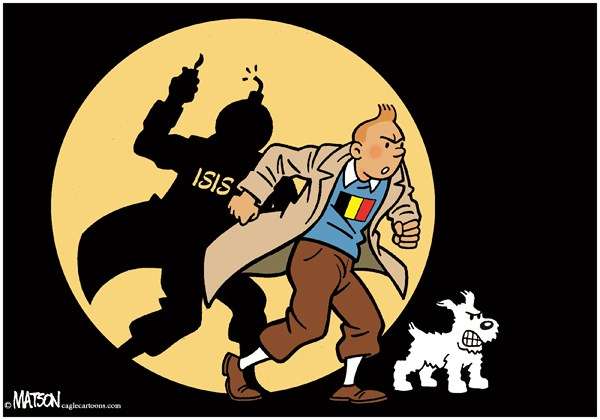The Trump-Cruz (and Clinton) Police State Is Already Alive in France
But does it work? And should we import it to the United States? No and no.

In the wake of the Brussels attacks by jihadists linked to ISIS, leaders in Europe and the United States are making new calls for all sorts of jacked-up policing and surveillance of…everything and everyone.
GOP presidential candidate and Texas Sen. Ted Cruz has said, "We need to empower law enforcement to patrol and secure Muslim neighborhoods before they become radicalized." (As Scott Shackford noted, the New York Police Department tried exactly that and it was double failure: It alienated people and didn't uncover radicals).
At Bloomberg View, Eli Lake adroitly points out that the sort of proposals pushed by Cruz, Donald Trump, and in an earlier iteration of her protean self, Hillary Clinton, are already at work in France. Do they work and are they relevant or adaptable to American needs and mores? The short answer to these questions is no.
France, explains Lake, has been in a state of emergency since the Paris attacks last year and Francois Hollande oversees "a policy to monitor thousands of Muslim citizens even if they had no specific ties to terrorist groups" a "law to allow the police to search the homes of suspected terrorists without a warrant and to place terror suspects under house arrest without a court order." (In most European countries—and certainly France—the left is often hawkish and reflexively dismissive of civil liberties, especially for immigrants.)
Just listen to Bernard Cazeneuve, the French interior minister. Earlier this month, I asked him at a speech at George Washington University how many French citizens his government was now tracking. He responded, "We are monitoring several thousand people, individuals, not all of them are necessarily terrorists."

Not all of them terrorists! That should be worrying to say the least. The United Kingdom is doing similar things as well (it has a long history of suspending civil liberties in the wake of real and potential terrorist violence, dating back at least in current form to the 1970s, when the IRA was blowing stuff up on a regular basis). Like Reason's Shackford, Lake notes that the NYPD's attempt to do something along these lines with Muslim neighborhoods didn't yield results, other than pissing off the very people you would want to cooperate if in fact there is a problem.
And Lake drives home an essential point that often goes missing in discussions of European responses to terrorism: America does a far better job of assimilating not just immigrants but the children of immigrants.
The Muslim community here is far more integrated into society than many Muslims in European countries. As Seamus Hughes, a former U.S. National Counterterrorism Center official and deputy director of George Washington University's program on countering extremism, told me Tuesday, there have not been many examples of Muslim groups sprouting up in the U.S. that openly call for violence. What's more, Hughes said, among the 84 individuals arrested in connection to the Islamic State, there is no common profile, other than that they tend to be younger men. "In the United States, communities don't radicalize, individuals do," he said.
Sounding like terorrism realists such as John Mueller and Mark G. Stewart, Lake argues that terrorism is ultimately more of a crime-style problem and not something that will ever be fully eradicated. It can only be contained and minimized.
The response in France, Belgium and the U.K. to violent jihad is nonetheless a cautionary tale. When advanced democracies are terrorized, our freedoms are often the first casualty….Policing "Muslim neighborhoods" or preventing Muslim immigration will not prevent terrorist attacks…. As Europe is now learning, to delegate the war on terror to the police is not the end of war, but rather the beginning of a police state.
Reason's coverage of responses to the Paris attacks is worth reading through, especially as it highlights how quick politicians here were to chuck any pretense of due process and civil liberties out the window.


Show Comments (282)